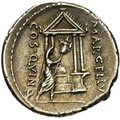
FOTO 1
Visit and discover Rome: 3000 years of history, art, architecture and culture

The Senate of Rome recognized to great generals of Rome, including Aemilius Paullus Macedonicus, Scipio Africanus, Marius, Sulla, Pompey Magnus, Julius Caesar, Marcus Agrippa, Drusus senior the honor to celebrate the Triumph.
The Romans were vires of militaries, and the valiant conduct in the war involved moral and material recognition, but it was not enough to be courageous, but also to show that they were clever men, or that the military actions were conducted so excellent to obtainer the desired result: the victory. [
1]
But not all of the victories were the same; there were victories for which the Senate recognized the "triumph" to the general; triumph was not only the greatest recognition that a Roman magistrate could aspire to, it was the recognition of an almost divine value. There were consuls who invented wars and generals who ordered carnage to achieve a triumph because the Romans also had a magnitude scale for victories and the units were the number of enemies killed: a triumph required the least 5,000 warriors enemies killed.
The Triumph was a triumphal march, where a procession accompanied the winner, who was standing on a quadriga drawn by four white horses, dressed like a god and wearing a laurel wreath; his carriage was preceded by the defeated enemy, the spoil of precious objects and slaves and from spolia, the weapons taken from the enemy. Each Roman monument that celebrates a victory has among the symbols of victory the spolia or all the weapons and personal belongings that had been of the enemies chief.
There was an acknowledgment particular: Spolia Opima. It was a high honor that the Senate recognized only to the army commander who had personally killed in a duel your opponent's king, almost an emulation of the clash between the champions of two peoples: the commander-in-chief was the champion of his army fighting in the field with his soldiers and was able to annihilate the enemy and kill his alter ego personally. The winner went to the Temple of Jupiter Feretrius and consecrated to God the spolia opima of the enemy king, while in other cases the consecration of spolia was done to the temple of Mars or Janus. [
2]
In the entire history of Rome only three times the triumphant was able to consecrate to Jupiter the weapons that had been taken away from the enemy; The first was Romulus who, after two years from the foundation of Rome, killed Acron king of the Ceninenians in battle and consecrated the King's weapons defeated on the Jupiter Feretrio altar which had just been built on the Palatine Hill. [
3]
The ritual would be born with Romulus and Plutarch, in his Life of Romulus, describes how he created the trophy:
"Romulus cut into the Roman camp a very large oak, giving it the shape of a trophy and hanging Acrone's weapons ...".
The second time the Senate recognized the Spolia Opima in 437 BC to the military tribuni Aulus Cornelius Cossus, who defeated and killed Lars Tolumnius, the king of Veii, in the battle of Fidenae which was a great victory of Rome although not decisive for the conflict between Rome and Veii.
The deeds of Cornelius Cossus have been described by Titus Livius: "... while the king was trying to get up, Cossus threw it back to earth with a shield and then, repeatedly hitting him, pinned him to the ground with his spear. Then, triumphant, he showing the weapons taken to the corpse and the behead stuck on the tip of the rod, putting to flight the enemies, terrified by killing of your king".
Cornelius Cossus acclaimed by the roman people, during the ceremony of the Triumph, personally led the chariot on which they were hoisted Spolia Opima of Lars Tolumni as far as the Temple of Jupiter Feretrius. But the Romans, who in the triumph celebrated victory in the war, did not forget the defeats, especially when they were tragic and had led to the sacrifice of an entire army, and so Cornelius Cossus devoted Tolumni Spolia Opima to Quintuss Fabius Vibulans, the chief of the 306 Fabii slaughtered by the Veniants in the Battle of Cremera ... [
4]
Per leggere tutto l'articolo iscriviti!
di M.L. ©RIPRODUZIONE RISERVATA (Ed 1.0 - 13/11/2017)







Copyright © 2015- 2019 - All Rights Reserved - RomeAndArt.eu - VAT IT 12335381005
E-mail | Disclaimer | Privacy - Change cookies settings
Thanks to OS Templates